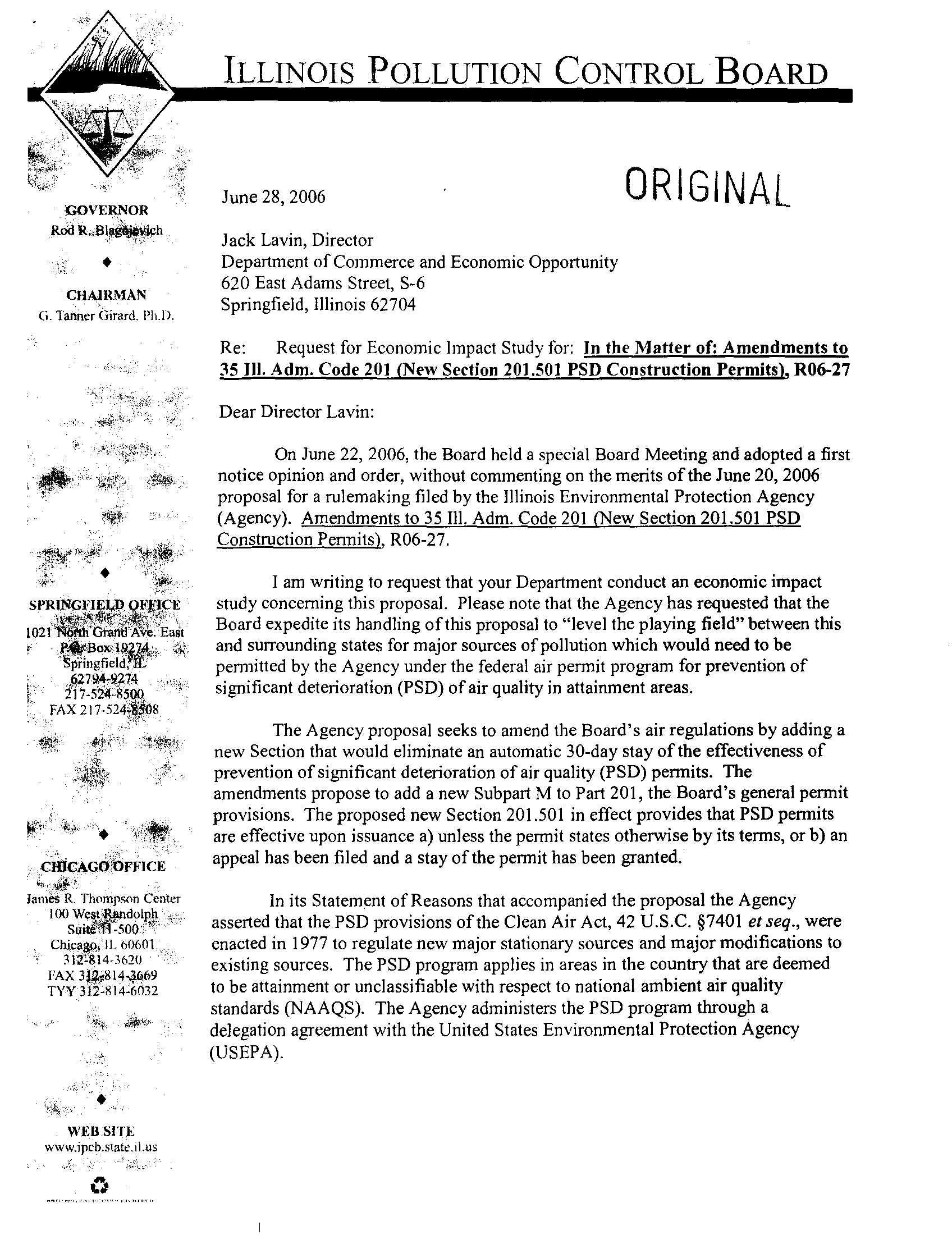GOVERNOR
Rod
R.,Blagajo
wFh
CHAIRMAN
C
.
Tanner
Girard . PhD .
CB)CAGO'OFFICE
lames R . Thompson Center
100 West,
tdolph
.,
SuittWI-500"'"
Chicagg,!.IL 60601 .
312°-914-3620
FAX 312014,3b69
TYY312-814-6032
WEB SITE
www.ipcb.state.ii us
w
6
ILLINOIS POLLUTION CONTROL BOARD
June 28, 2006
Jack Lavin, Director
Department of Commerce and Economic Opportunity
620 East Adams Street, S-6
Springfield, Illinois 62704
Re :
Request for Economic Impact Study for
: Inthe Matterof: Amendments to
35 III. Adm. Code 201 (New Section 201 .501PSD Construction Permits), R06-27
Dear Director Lavin :
On June 22, 2006, the Board held a special Board Meeting and adopted a first
notice opinion and order, without commenting on the merits of the June 20, 2006
proposal for a rulemaking filed by the Illinois Environmental Protection Agency
(Agency)
. Amendments to 35 111. Adm. Code 201 (New Section 201 .501 PSD
Construction Permits), R06-27 .
I am writing to request that your Department conduct an economic impact
study concerning this proposal . Please note that the Agency has requested that the
Board expedite its handling of this proposal to "level the playing field" between this
and surrounding states for major sources of pollution which would need to be
pennitted by the Agency under the federal air permit program for prevention of
significant deterioration (PSD) of air quality in attainment areas
.
The Agency proposal seeks to amend the Board's air regulations by adding a
new Section that would eliminate an automatic 30-day stay of the effectiveness of
prevention of significant deterioration of air quality (PSD) permits . The
amendments propose to add a new Subpart M to Part 201, the Board's general permit
provisions. The proposed new Section 201 .501 in effect provides that PSD permits
are effective upon issuance a) unless the permit states otherwise by its terms, orb) an
appeal has been filed and a stay of the permit has been granted
.
In its Statement of Reasons that accompanied the proposal the Agency
asserted that the PSD provisions of the Clean Air Act, 42 U .S.C. §7401 et seq., were
enacted in 1977 to regulate new major stationary sources and major modifications to
existing sources. The PSD program applies in areas in the country that are deemed
to be attainment or unclassifiable with respect to national ambient air quality
standards (NAAQS). The Agency administers the PSD program through a
delegation agreement with the United States Environmental Protection Agency
(US EPA)
.
ORIGINAL
PSD involves a preconstruction permitting process in which an applicant for
a major new source or modification must submit a permit application prior to
commencing construction. The applicant must demonstrate that emissions from the
proposed facility will not cause or contribute to an exceedance of any applicable
NAAQS or air quality increment, and that the proposed facility will employ the Best
Available Control Technology for all pollutants for which the source is major
.
The Agency stated that an appeal of the PSD permit issued in Illinois is
subject to the procedural requirements of the federal regulations at 40 CFR Part 124,
which provide that final permits decisions are automatically stayed for 30 days after
issuance. This rulemaking proposes to eliminate the automatic 30-day stay, thereby
"leveling the playing field" between Illinois and surrounding states that have
approved programs without the automatic stay . The Agency's stated goal is to
remove an economic disincentive to new development while not causing any adverse
impact to the environment
.
Since 1998, Section 27 (b) of the Environmental Protection Act has required
the Board to :
1) "request that the Department of Commerce and Economic Opportunity
(formerly the Department of Commerce and Community Affairs) conduct a
study of the economic impact of the proposed rules . The Department may
within 30 to 45 days of such request produce a study of the economic impact
of the proposed rules. At a minimum, the economic impact study shall
address a) economic, environmental, and public health benefits that may be
achieved through compliance with the proposed rules, b) the effects of the
proposed rules on employment levels, commercial productivity, the economic
growth of small businesses with 100 or less employees, and the State's
overall economy, and c) the cost per unit of pollution reduced and the
variability of company revenues expected to be used to implement the
proposed rules; and
(2) conduct at least one public hearing on the economic impact of those
rules. At least 20 days before the hearing, the Board shall notify the public of
the hearing and make the economic impact study, or the Department of
Commerce and Economic Opportunity's explanation for not producing an
economic impact study, available to the public . Such public hearing may be
held simultaneously or as a part of any Board hearing considering such new
rules." 415 ILCS 5/27(b) (2004)
.
As earlier-stated, the Board has received a request from the Agency that the
Board expedite this proposal. The Board has filed this proposal for first notice
publication in the
Illinois
Register, and is in the process of scheduling hearings as
soon in August 2006 as possible . I would greatly appreciate a response from you
concerning DCEO's position on whether it will perform the economic impact study
as soon as is possible. Receipt of your answer on or before July 14, 2006 would be
helpful .
If I, or my staff, can provide you with any additional information, please let
me know .
Thank you for your early response
.
Sincerely,
G. Tanner Girard
Acting Chairman
Pollution Control Board
Cc: Warren Ribley, DCEO
Dorothy M. Gunn, Clerk of the Board
Erin Conley, Rules Coordinator
